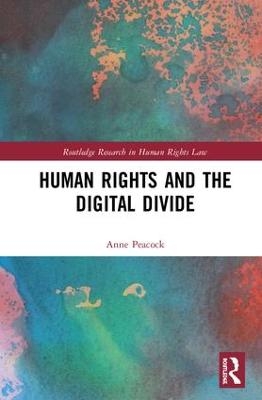
Human Rights and the Digital Divide
Seiten
2019
Routledge (Verlag)
978-1-138-48606-5 (ISBN)
Routledge (Verlag)
978-1-138-48606-5 (ISBN)
Within the context of existing freedom of expression guarantees, this book critically evaluates the goal of bridging the "digital divide," the gap between those who have access to the Internet and those who do not.
The Internet’s importance for freedom of expression and other rights comes in part from the ability it bestows on users to create and share information, rather than just receive it. Within the context of existing freedom of expression guarantees, this book critically evaluates the goal of bridging the 'digital divide' – the gap between those who have access to the Internet and those who do not. Central to this analysis is the examination of two questions: first, is there a right to access the Internet, and if so, what does that right look like and how far does it extend? Second, if there is a right to access the Internet, is there a legal obligation on States to overcome the digital divide?
Through examination of this debate’s history, analysis of case law in the European Court of Human Rights and Inter-American Court of Human Rights, and a case study of one digital inclusion programme in Jalisco, Mexico, this book concludes that there is indeed currently a legal right to Internet access, but one that it is very limited in scope. The 2012 Joint Declaration on Freedom of Expression and the Internet is aspirational in nature, rather than a representative summary of current protections afforded by the international human rights legal framework. This book establishes a critical foundation from which some of these aspirations could be advanced in the future. The digital divide is not just a human rights challenge nor will it be overcome through human rights law alone. Nevertheless, human rights law could and should do more than it has thus far.
The Internet’s importance for freedom of expression and other rights comes in part from the ability it bestows on users to create and share information, rather than just receive it. Within the context of existing freedom of expression guarantees, this book critically evaluates the goal of bridging the 'digital divide' – the gap between those who have access to the Internet and those who do not. Central to this analysis is the examination of two questions: first, is there a right to access the Internet, and if so, what does that right look like and how far does it extend? Second, if there is a right to access the Internet, is there a legal obligation on States to overcome the digital divide?
Through examination of this debate’s history, analysis of case law in the European Court of Human Rights and Inter-American Court of Human Rights, and a case study of one digital inclusion programme in Jalisco, Mexico, this book concludes that there is indeed currently a legal right to Internet access, but one that it is very limited in scope. The 2012 Joint Declaration on Freedom of Expression and the Internet is aspirational in nature, rather than a representative summary of current protections afforded by the international human rights legal framework. This book establishes a critical foundation from which some of these aspirations could be advanced in the future. The digital divide is not just a human rights challenge nor will it be overcome through human rights law alone. Nevertheless, human rights law could and should do more than it has thus far.
Anne Peacock earned her PhD at the Human Rights Centre at the University of Essex. After teaching and researching in Guadalajara, Mexico, for five years, she was a policy advisor at the U.S. Department of State for 10 years. She currently works at the U.S. Department of the Treasury.
1. General Introduction
2. Historical Context of International Debates on a Right to Access to Information Technology and Digital Divide Guarantees
3. Negative Obligations
4. Positive Obligations to Facilitate Access to the Internet
5. Looking Outside Freedom of Expression to Strengthen Digital Inclusion Guarantees
6. Case Study in Digital Inclusion
7. Conclusions
| Erscheinungsdatum | 18.06.2019 |
|---|---|
| Reihe/Serie | Routledge Research in Human Rights Law |
| Zusatzinfo | 1 Line drawings, black and white |
| Verlagsort | London |
| Sprache | englisch |
| Maße | 156 x 234 mm |
| Gewicht | 530 g |
| Themenwelt | Recht / Steuern ► EU / Internationales Recht |
| Recht / Steuern ► Öffentliches Recht ► Völkerrecht | |
| Sozialwissenschaften ► Politik / Verwaltung ► Politische Systeme | |
| Sozialwissenschaften ► Politik / Verwaltung ► Staat / Verwaltung | |
| ISBN-10 | 1-138-48606-X / 113848606X |
| ISBN-13 | 978-1-138-48606-5 / 9781138486065 |
| Zustand | Neuware |
| Informationen gemäß Produktsicherheitsverordnung (GPSR) | |
| Haben Sie eine Frage zum Produkt? |
Mehr entdecken
aus dem Bereich
aus dem Bereich


